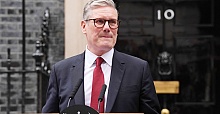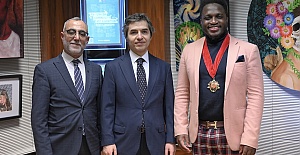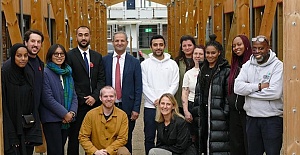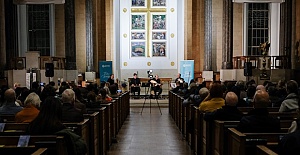In the immediate aftermath of the fall of Ukraine's former President, Viktor Yanukovych, the leaders of Ukraine’s revolution have told Western governments that they have until Friday 28th February, to find €5 billion to avert economic collapse . It has been suggested by a senior Western diplomat that, according to one of the most influential figures in the former opposition, “they need €5 billion [£4.1 billion] by the end of the week” to cover the €1.3 billion in gas bills to Russia and €870 million owing to the International Monetary Fund with the rest being owed in public sector salaries and pensions. In response, the European Union's foreign policy chief, Baroness Ashton has promised Ukraine's new leaders strong international support on Tuesday, including to fight an economic crisis, and urged Russia to let the country move forward "in the way it chooses".
Close neighbours, Russia has voiced alarm and anger at the overthrow of Ukraine's President Viktor Yanukovych by protesters in Kiev. Moscow has questioned the legitimacy of Ukraine's interim leaders and it has suspended financial assistance together with the recalling of its ambassador from Kiev. But as Ukrainian politics is evolving every day, this situation is likely to be reversed in fairly early course. Much is at stake for Russia: President Vladimir Putin has sought to pull Ukraine into a Russian-led customs union and for centuries the two neighbours have had a common destiny. Restoring the status quo ante is no longer a viable option for Moscow because for all its influence, it cannot undo the dramatic changes, nor does it seem interested in trying to restore ousted President Yanukovych to power, a man seemingly universally disliked.
Russia's strategic options are various but limited. Building upon the opposition to Kiev in mainly Russian-speaking eastern parts of Ukraine has its limits, whilst playing the 'divide and rule' card of splitting the country appears neither feasible nor attractive to Moscow, despite recent developments in Sevastopol, the strategic port and naval base in Crimea. Pro-Russian protesters in Sevastopol say their city must be defended from the Kiev "extremists" and there are reports that Russia may make it easier for people in Crimea to get Russian passports. Crimea only became part of Ukraine in 1954, in Soviet times. Equally, Moscow's primary focus could be to support the emergence of new political leaders with nationwide appeal, particularly in eastern Ukraine, who could replace Mr Yanukovych's demoralised Party of Regions. They could then challenge the parties that spearheaded the anti-Yanukovych protests in the past three months.
If the Russian-led response is robust, the EU has been timid. The USA have been steadily adopting a policy of international disengagement save for areas of specific interest, notably the Middle East and the Eastern Mediterranean regions. America was pointedly not engaged in the Libyan crisis leaving that to the EU to basically 'screw-up' on their own and in relation to the Ukraine, the USA have said they wish to 'work with' Russia to aid the country to govern themselves and to respect the democratic process, but are otherwise arms-length in terms of engagement. This exposes the great innate frailties of the European Union because when all is said and done, the EU is NOT a political body it is a trade bloc. It is NOT a Union of Federal States and is not the democratically elected government of wider Europe although many think that it is or, that it should be. Certainly, the USA would welcome such a Federation because they would effectively control it, despite all the dangers of upsetting the balance of global power that would bring.
The EU has extended its influence way beyond either the intentions of its founding fathers and its pan-European boundaries. It has also over-extended its political activities beyond its competences becoming more of a meddlesome body than a respected world power, the latter having never previously been envisioned. It is surely time that the role of the EU was properly defined and if it is to become the United States of Europe, member states need to be allowed to decide whether or not they wish to become a mere Federal State under Germany, for the latter will inevitably be the reality if the USE is formalised.


 Prime Minister Keir Starmer's 2025 Easter message
Prime Minister Keir Starmer's 2025 Easter message After Nesil Caliskan a by-election will be held in Jubilee ward in Enfield
After Nesil Caliskan a by-election will be held in Jubilee ward in Enfield Publishing the analysis, Labour’s Cllr Ergin Erbil said Everybody in Enfield deserves basic rights
Publishing the analysis, Labour’s Cllr Ergin Erbil said Everybody in Enfield deserves basic rights Gaza-Israel conflict Statement from Cllr Ergin Erbil, Leader of Enfield Council
Gaza-Israel conflict Statement from Cllr Ergin Erbil, Leader of Enfield Council The European Union called on Turkey to uphold democratic values
The European Union called on Turkey to uphold democratic values Turkish citizens in London said Rights, Law, Justice
Turkish citizens in London said Rights, Law, Justice The Council of Turkish Cypriot Associations Geneva response letter
The Council of Turkish Cypriot Associations Geneva response letter Sustainable Development and ESG, Will This Become the Course for Turkic World
Sustainable Development and ESG, Will This Become the Course for Turkic World The 'Prince of Paris' has impressed in his first EuroLeague season
The 'Prince of Paris' has impressed in his first EuroLeague season Saran Media And Euroleague Basketball Extend Media Rights Partnership for Four More Years
Saran Media And Euroleague Basketball Extend Media Rights Partnership for Four More Years Will Rangers be Jose Mourinho’s next victim?
Will Rangers be Jose Mourinho’s next victim? Jose Mourinho's Fenerbahce face Rangers on Thursday
Jose Mourinho's Fenerbahce face Rangers on Thursday Barclays has become the biggest UK lender so far to cut mortgage rates
Barclays has become the biggest UK lender so far to cut mortgage rates THE SPRING STATEMENT EXPLAINED, UK ECONOMIC OUTLOOK AND GROWTH FORECASTS
THE SPRING STATEMENT EXPLAINED, UK ECONOMIC OUTLOOK AND GROWTH FORECASTS Launch of Made in Enfield gift shop to celebrate local artists and designers
Launch of Made in Enfield gift shop to celebrate local artists and designers Trial used smart Wi-Fi sensors for live building occupancy data to optimise
Trial used smart Wi-Fi sensors for live building occupancy data to optimise

















